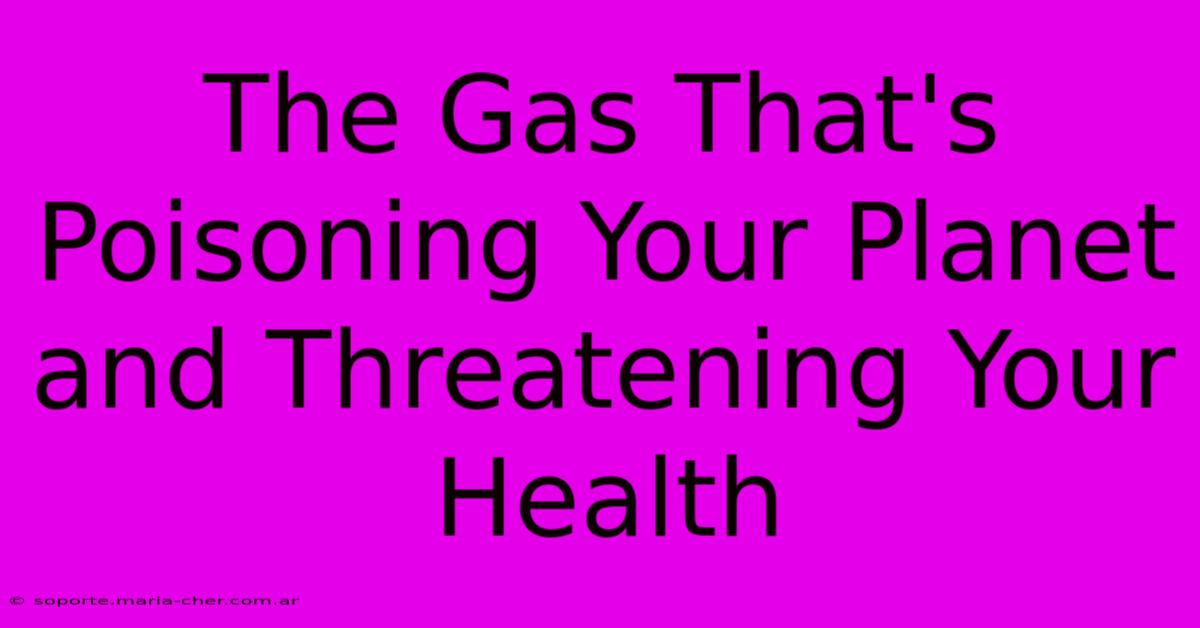The Gas That's Poisoning Your Planet And Threatening Your Health

Table of Contents
The Gas That's Poisoning Your Planet and Threatening Your Health: Methane
The air we breathe is under attack. While carbon dioxide often grabs the headlines in the climate change conversation, another insidious gas is silently poisoning our planet and threatening our health: methane. This potent greenhouse gas is far more dangerous than CO2 in the short term, demanding immediate attention and action.
Understanding the Methane Menace
Methane (CH₄) is a colorless, odorless gas that's a major component of natural gas. While it occurs naturally, human activities have dramatically increased its atmospheric concentration, leading to a concerning rise in global temperatures and adverse health impacts. Let's delve into the sources and consequences:
Sources of Methane Emissions:
- Fossil Fuel Production: Leaks from natural gas wells, pipelines, and processing facilities are significant contributors. The extraction and transportation of oil and coal also release methane.
- Agriculture: Livestock, particularly cattle and sheep, produce substantial amounts of methane through their digestive processes (enteric fermentation). Rice cultivation in flooded paddies also releases significant methane.
- Waste Management: Landfills are major sources of methane, generated by the decomposition of organic waste. Wastewater treatment plants also contribute.
- Other Sources: Methane emissions also originate from wetlands, thawing permafrost (a particularly worrying consequence of climate change), and certain industrial processes.
The Devastating Impacts of Methane:
Environmental Impacts:
- Accelerated Global Warming: Methane is over 80 times more potent than carbon dioxide at trapping heat in the atmosphere over a 20-year period. This means even small amounts have a significant warming effect. The rising global temperatures contribute to extreme weather events, sea-level rise, and disruptions to ecosystems.
- Air Pollution: Methane contributes to the formation of ground-level ozone, a major component of smog, which causes respiratory problems and other health issues.
- Water Contamination: Methane released into water bodies can deplete oxygen, harming aquatic life.
Health Impacts:
- Respiratory Problems: Exposure to high levels of methane can cause headaches, dizziness, and in severe cases, asphyxiation. The associated air pollution from methane contributes to respiratory illnesses like asthma and bronchitis.
- Cardiovascular Issues: Studies suggest a link between air pollution (including methane-related smog) and cardiovascular diseases.
- Neurological Effects: Some research indicates potential neurological effects from long-term exposure to methane and its associated pollutants.
Combating the Methane Threat: What Can We Do?
Tackling the methane challenge requires a multi-pronged approach involving governments, industries, and individuals:
Policy and Regulation:
- Stronger emission standards: Governments need to enforce stricter regulations on methane emissions from various sources, including fossil fuel production, agriculture, and waste management.
- Incentivizing methane reduction: Financial incentives and carbon pricing mechanisms can encourage businesses and individuals to adopt methane-reducing technologies and practices.
- International cooperation: Global collaboration is crucial to address this global problem effectively.
Technological Solutions:
- Leak detection and repair: Investing in advanced technologies to detect and repair methane leaks from pipelines and other infrastructure is vital.
- Methane capture and utilization: Developing technologies to capture methane from landfills and other sources and use it as a fuel source can reduce emissions.
- Improved livestock management: Adopting better livestock feeding practices and exploring alternative feed sources can lessen methane emissions from agriculture.
Individual Actions:
- Reduce meat consumption: Decreasing meat consumption, particularly red meat, can significantly reduce your contribution to methane emissions from agriculture.
- Support sustainable agriculture: Choose food products from farms that employ sustainable practices to minimize methane emissions.
- Reduce waste: Properly dispose of waste to minimize methane production in landfills.
The fight against methane pollution is a critical battle in the larger war against climate change and for the health of our planet and its inhabitants. By understanding the problem, adopting sustainable practices, and supporting policies that promote methane reduction, we can pave the way for a cleaner, healthier future.

Thank you for visiting our website wich cover about The Gas That's Poisoning Your Planet And Threatening Your Health. We hope the information provided has been useful to you. Feel free to contact us if you have any questions or need further assistance. See you next time and dont miss to bookmark.
Featured Posts
-
The Ultimate Weapon Optimizing Your Ux Design Portfolio For Google Discovery
Feb 05, 2025
-
Deadly Broccoli Fdas Walmart Warning
Feb 05, 2025
-
The Grand Prairie 40 Enigma Unraveling The Unanswered Questions
Feb 05, 2025
-
The Kaleidoscope Of Independence Which Color Dominates The Mosaic Of Liberty
Feb 05, 2025
-
Fantastic Four Debut Trailer Released
Feb 05, 2025
